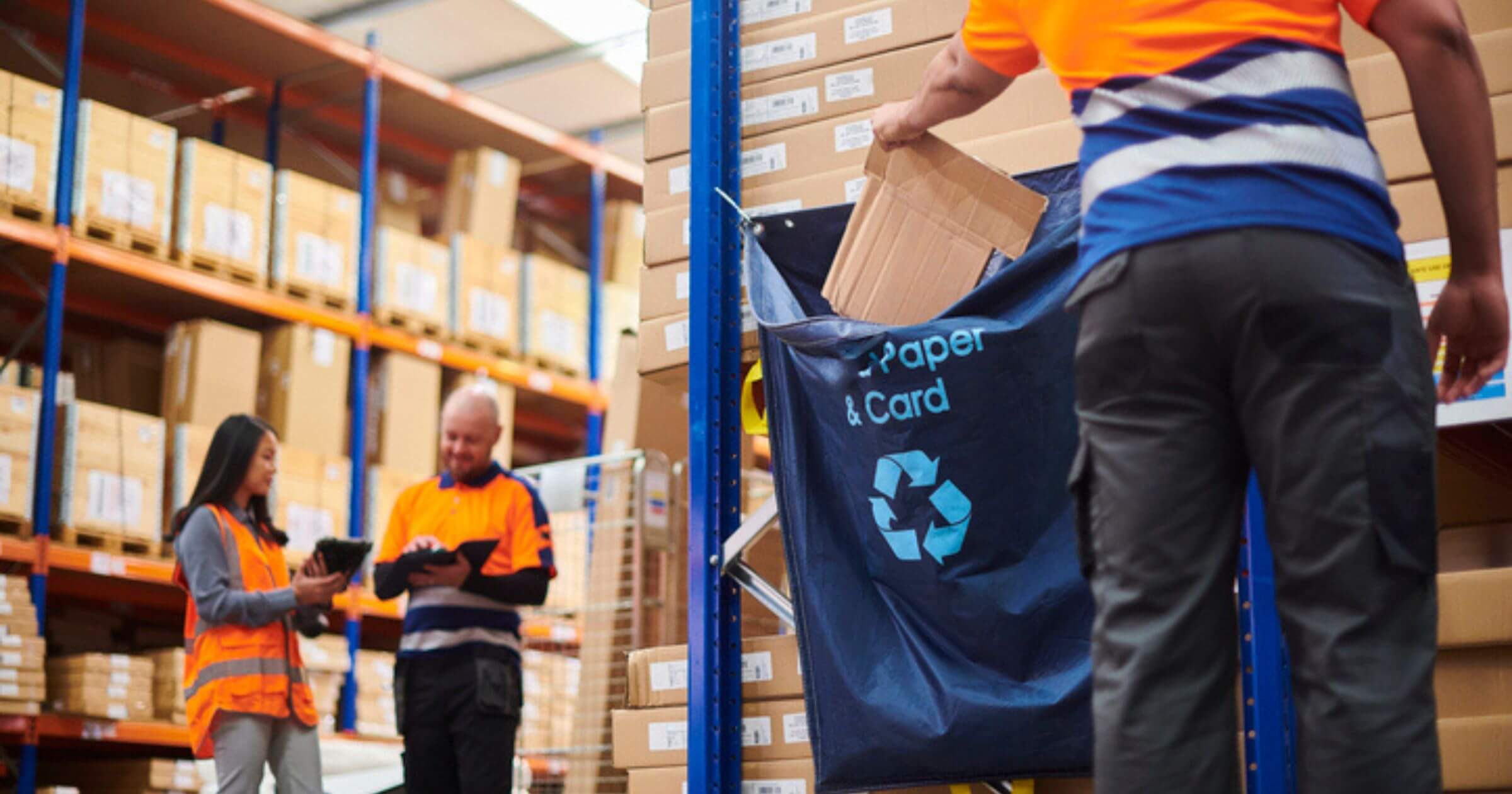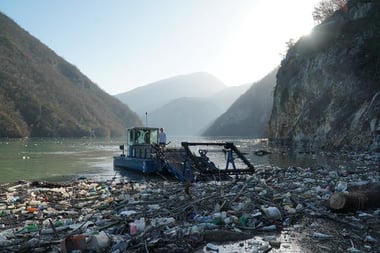
Beth Howell
Beth has been writing about the environment and climate change for over four years now – with her work being featured in publications such as The BBC, Forbes, The Express, Greenpeace, and in multiple academic journals.
Who should pay for products to be recycled and fed back to the circular economy? This is a complex question — one that regulators have been asking more frequently in recent years.
Traditionally, local governments would pay for waste material to be recovered, recycled, and returned to the economy. However, not all countries have sufficient funds to do this, and some of the ones that do, have been importing a lot of their waste to developing countries.
This mismanaged waste is contributing to the ongoing plastic pollution crisis, which is impacting some of the globe’s most sensitive natural environments.
To combat this issue, governing bodies have a solution: shift the responsibility onto businesses through Extended Producer Responsibility (EPR). Want to know more about this legislation? Scroll down to learn about how it works, which businesses it impacts, and why it’s important.
Once you're up to date with EPR regulation, it's time to get your company's plan in place — that's where we come in. You can partner with CleanHub to collect plastic as part of your EPR program. All you need to do is get in touch with our in-house team of experts, who can help you choose the right plan to suit your business’s needs.
What’s on this page?
01 | What is Extended Producer Responsibility (EPR)?02 | Which countries have EPR laws in place?
03 | How does EPR legislation reduce waste exports to developing countries?
04 | Top 5 benefits of EPR legislation
05 | Summary: How can CleanHub support you with EPR legislation?
06 | FAQs
What is Extended Producer Responsibility (EPR)?
Extended producer responsibility (EPR) is a regulatory system that holds brands and other enterprises accountable for the waste their products produce.
The framework incentivizes companies to move towards a more sustainable, circular economy by rethinking product design, re-usability of items, and recycling collection rates.
By addressing the root cause of waste (packaging that is difficult to recover and reuse), EPR cuts pollution off at the source.
EPR was introduced as a concept in the early 1990s. It has since been formalized by the OECD, which describes it as “an environmental policy approach, in which a producer’s responsibility for a product is extended to the post-consumer stage of a product’s life cycle.”
How does it work?
Extended producer responsibility laws vary from country to country, which means the exact process is different depending on where your business is located.
Generally, enterprises generating a certain amount of profits, whilst also producing a lot of waste, will be held accountable.
Obligated businesses will need to implement a detailed EPR plan, which will help them tackle the waste problem by outlining how the business will reduce waste production rates.
Although the specific requirements for EPR plans vary, they can include reducing plastic packaging, recycling materials efficiently, or investing in plastic recovery projects.
Once the EPR plan is in place, a third party will carry out regular audits to make sure the producer is compliant with the law.
Which countries have EPR laws in place?
A growing number of countries are implementing EPR laws in a bid to cut back on waste.
As with any complex policy, EPR is not a one-size-fits-all solution, which means the success seen in some countries is not guaranteed in others — this is largely down to funding and resources.
Let’s compare how EPR functions in both developed and developing countries.
EPR in developed countries
Many nations in the European Union (EU) have had EPR legislation in place for a while now. In fact, EPR law was first formally introduced in 1990, by Thomas Lindhqvist in a report to the Swedish Ministry of the Environment.
France has also long been one of the pioneers, having implemented EPR for specific materials as far back as 1992. The policy has been incredibly successful, with recycling rates for batteries soaring to 80% in the past 20 years, and packaging waste recovery growing by 50% since the schemes began.
Countries like Canada, Belgium, and South Korea have also seen recycling rates exceed 75% for materials targeted by EPR.
The packaging industry takes EPR seriously, and is planning for the arrival of tighter restrictions in countries like the UK, France, and Germany. Some states in the US have also implemented EPR legislation.
All of these countries have one key thing in common: the resources and funding needed to support EPR. It’s an expensive policy to implement, requiring new reporting tools, data-gathering knowledge, and waste management facilities to process more recycled material.
Unfortunately, the nations that suffer the most from the waste crisis face the biggest hurdles to introducing EPR.
EPR in developing nations
Despite experiencing some of the worst effects of waste pollution, many developing countries are yet to implement EPR regulations.
Unfortunately, people living in these areas are likely to experience serious health issues because of high levels of waste. In fact, anywhere between 400,000 and 1 million people die each year from diseases caused by mismanaged waste in developing countries.
Although EPR laws could alleviate some effects of plastic pollution, the laws require infrastructure and funding that many of these nations simply don’t have access to.
A lot of fundamental waste management processes need to be improved in developing nations before EPR can be implemented with any success.
Dr. Lewis Akenji, a former director at The Institute for Global Environmental Studies, suggests one of the barriers is that “many developing countries are trying to apply the EPR model that was developed for and by industrialized countries”.
Despite these challenges, the Philippines released its first-ever EPR legislation in July 2022, to combat its plastic waste crisis — a historical move for the country.
With this law in place, large enterprises are now responsible for the packaging they generate and are required to recover 80% of their plastic waste by 2028.
Find out everything you need to know about this law on our page: How Does Extended Producer Responsibility Work in the Philippines?

How does EPR legislation reduce waste exports to developing countries?
By introducing EPR regulations, developed countries won’t be exporting as much waste to countries with lower GDP.
Around 5 million tons of plastic waste was traded globally in 2020, with developed countries often exporting this waste to poorer nations, rather than recycling it or disposing of it properly.
Although this figure is shockingly high, it’s shrunk by over a third since 2010 thanks to new environmental legislation around the world, including EPR.
The introduction of EPR means brands are now incentivized to track the full lifecycle of their waste, not just the production of it. Encouraged by reduced fees, companies are more likely to design material that actually gets recovered, meaning less of it gets sent overseas.
Tightened regulations, combined with consumer pressure, have also increased the demand for secondary recycled material. The financial benefits of circularity are beginning to outweigh irresponsible waste management practices in high-income countries, for which developing nations pay the biggest price.
Top 5 benefits of EPR legislation
There are plenty of benefits to introducing more stringent EPR laws around the world — the most obvious one being that it helps tackle the waste issue.
To get a more detailed understanding, check out the top five benefits below.
1. Reduces waste pollution
Researchers suggest that there are over 170 trillion pieces of plastic in the ocean. As if this wasn’t bad enough, global waste levels are set to reach 3.4 billion metric tons by 2050 — a 70% increase from today’s levels.
Introducing more stringent EPR legislation can prevent this from escalating.
If implemented correctly, these laws can hold companies accountable for their waste, meaning we can clean up the plastic that’s already littering the planet, and prevent the buildup from continuing.
2. Economic benefits
It’s not just the environment that benefits from EPR laws — the economy does too. For example, the US recycling industry supports nearly 20,250 manufacturing jobs and provides an economic impact of $9.8 billion each year to the sector.
And with some developing nations, such as the Philippines, beginning to roll out EPR legislation, we can expect more environmentally friendly job opportunities to become available.
3. Promoting a circular economy
To reduce the amount of waste on the planet, we need to ditch single-use products and embrace the circular economy — EPR laws play a crucial part in this transition.
Not only will this benefit the environment and wildlife, but humans too. The World Economic Forum suggests that a circular economy provides a $4.5 trillion growth opportunity by 2030 by avoiding waste, making businesses more efficient, and creating new employment avenues.
4. Helps to conserve natural resources
With an effective EPR strategy in place, countries can conserve finite natural resources by promoting recycling, material recovery, and the creation of a circular economy.
We need to adopt this approach urgently, since resource extraction has more than tripled since 1970, according to the United Nations.
And future consumption levels are looking equally bleak — especially as events like Black Friday continue to gain popularity. Global material use could double to 190 billion tons by 2060, leading greenhouse gas emissions to increase by 43%.
5. Businesses can benefit from EPR incentives
As well as strengthening the economy, businesses can benefit from EPR programs. In some countries, business costs related to EPR activities are considered necessary expenses, which means they’re deductible from gross income.
Adopting an ERP strategy can also help businesses attract more clients and customers, as the rise of the conscious consumer continues. Since 2016, global Google searches relating to sustainable goods have increased by 71%.
Summary: How can CleanHub support you with EPR legislation?
EPR legislation is here to stay. It benefits the economy, the environment, and even businesses.
Figuring out how your brand can be EPR compliant is no easy task — but we’re here to help, no matter where you’re based.
By partnering with CleanHub, you can help fund the collection and disposal of ocean-bound plastic, whilst also boosting your brand’s legacy. You can also talk to our experts about which areas your company could cut back on waste and how to reduce your plastic footprint.
All you have to do is pop a few details about your business in the free form below, and we'll be in touch to get the ball rolling.
Want to reduce your business’s plastic footprint? We can help. All you have to do is get in touch with our in-house team using the form below. Once we’ve received your details, we can arrange a call to discuss which plastic recovery plan will suit your business needs best.
FAQs
What is EPR in simple terms?
Extended producer responsibility is legislation that’s being introduced in various countries to reduce the amount of waste businesses generate.
The law essentially shifts the responsibility of product waste from the government onto the businesses operating in that country.
The framework encourages a change in attitude towards product design, re-usability of items, and recycling collection rates.
What are the benefits of EPR?
The key benefits of EPR legislation are that it:
- Reduces plastic pollution
- Can boost the economy
- Promotes a circular economy
- Helps to conserve natural resources
What is an example of EPR?
Some key examples of EPR activities around the world include:
- Introducing recovery schemes – This can be in the form of buying back material/waste from consumers
- Establishing a recycling system – This can also include composting, thermal treatment, and other waste diversion
- Transporting plastic waste – Ensuring it goes to an appropriate processing or disposal site, rather than in an open environment

.webp)

.webp?width=380&name=Water-bottles%20(1).webp)
.webp?width=380&name=CleanHub-collectors-%20(1).webp)
.webp?width=380&name=Plastic-water-bottles%20(1).webp)

.png?width=380&name=CleanHub%20Bcorp%20(1).png)
.webp?width=380&name=Beach-clean%20(1).webp)
.webp?width=380&name=ESG-meeting%20(1).webp)

.webp?width=380&name=wave%20(1).webp)
